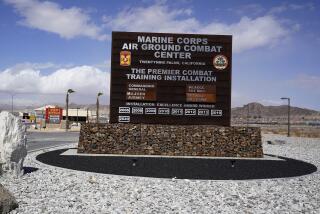Kurt Chew-Een Lee dies at 88; decorated for bravery in Korean War
Like many Americans of his generation, Kurt Chew-Een Lee was eager to fight in World War II. He left college at age 18 to enlist in the Marine Corps.
Beyond a deeply felt patriotism, Lee had a personal motive: “I wanted to dispel the notion about the Chinese being meek, bland and obsequious,” he told The Times in 2010.
Rather than a combat billet, he was assigned as a language instructor in San Diego teaching Japanese. He was deeply disappointed but decided to remain in the Marine Corps after the war.
He became an officer, one of the first Asian American officers in the Marine Corps.
Then came the war in Korea and Lee got his chance to fight: as an infantry platoon leader in the brutal, frigid battle against numerically superior Chinese army troops at the Chosin Reservoir in December 1950.
“I was never afraid,” Lee said. “Perhaps the Chinese are all fatalists. I never expected to survive the war.”
Lee’s bravery and resourcefulness brought him the Navy Cross, the Silver Star and an enduring place among Marine heroes.
“His fighting style was ferocious and his leadership was inspirational,” said Joe Owen, who fought beside Lee.
Lee died March 3 at his home in Washington, D.C., possibly of a heart attack, his niece Lori Lee said. He was 88.
Lee was born Jan. 21, 1926, in San Francisco, the first of seven children. The family moved to the Sacramento area, where Lee’s father, an immigrant, was a farm produce distributor and prominent in the Chinese community. Lee attended Sacramento City College before enlisting.
Lee served in Vietnam as an intelligence officer and retired from the Marine Corps in 1968 as a major. He worked for New York Life Insurance as a trainee supervisor, and then for the National Rural Electric Cooperative Assn. as a regulatory compliance coordinator.
On Memorial Day in 2010, Lee’s bravery was the subject of a Smithsonian Channel documentary, “Uncommon Courage: Breakout at Chosin.”
Although by the Korean War the U.S. military had been ordered integrated, suspicions and stereotypical thinking about race remained. Skeptics asked whether a Chinese American officer would fight against Chinese troops.
“I would have ... done whatever was necessary,” Lee told a Times reporter. “To me, it didn’t matter whether those were Chinese, Korean, Mongolian, whatever — they were the enemy.”
Lee led his Marines in repulsing attacks by the surging Chinese troops. He donned an orange vest so his spread-out Marines could see him during a blizzard and follow his orders, even though the vest made him a target for snipers.
Hurling grenades, firing his rifle and shouting in Mandarin to confuse the enemy, Lee led his men in defending an escape route. Wounded, he refused to be evacuated. Days later he was wounded a second time and hospitalized. Determined to keep fighting, Lee commandeered a vehicle and raced to the front.
“I’ve told (Lee) many times: Thank God we had him,” a Marine in the platoon, Ronald Burbridge, said in the Smithsonian documentary.
Lee said that although some of the Marines under his command may not have liked him, they respected him. He deflected praise for his own actions, instead praising his troops.
“They were outstanding — they were my Marines,” Lee said.
Twice married, Lee is survived by a daughter, Nicole; sisters Faustina, Betty Mar and Juliet Yokoe; and brother Chew-Fan. Lee’s brothers Chew-Fan and Chew-Mon, who died in 1972, both served in Korea and were decorated for bravery.
The California State Military Museum honored Lee and his brothers with an exhibit.
“His legacy will always be that he broke down barriers,” Freeman Lee, past commander of the VFW Chung Mei Post 8358, told the Sacramento Bee.
Lee asked to be buried at Arlington National Cemetery.
More to Read
Start your day right
Sign up for Essential California for the L.A. Times biggest news, features and recommendations in your inbox six days a week.
You may occasionally receive promotional content from the Los Angeles Times.






